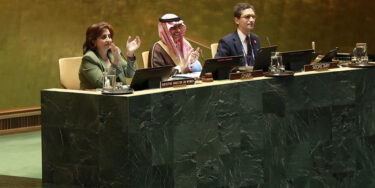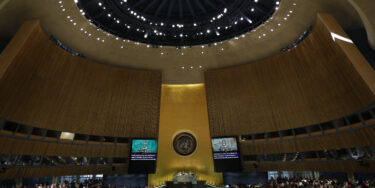OURs at the 13th AWID Forum
16.12.16
(Human Rights Bodies / Sexual Orientation and Gender Identity / Tradition, Culture, Religion)
Reclaiming Rights in the Face of Rising Fundamentalisms
This September, members of the Observatory on the Universality of Rights (OURs) met in Bahia, Brazil to participate in the 13th International Forum, a convening held by the Association for Women’s Rights in Development (AWID), the coordinating organization of the OURs Working Group.
The OURs initiative was formally presented to the Forum at a session titled “How Can We Reclaim Our Rights? Universal Human Rights and the Fierce Backlash of Religious Fundamentalisms”. During the session, which was moderated by Meghan Doherty of Sexual Rights Initiative, presentations were given by Zainah Anwar of Musawah, Carrie Shelver of the Coalition of African Lesbians (CAL), independent expert Cynthia Rothschild, and AWID’s Naureen Shameem. This session presented initial findings from the OURs’ first trends report (forthcoming).
“Push Back and Step Forward: Our Human Rights at Risk,” a second session, was presented by Marisa Viana of RESURJ, Juan Marco Vaggione of Católicas por el Derecho a Decidir Argentina, Mirta Moragas of Ipas, and Karima Bennoune, who spoke in her personal capacity. This discussion traced the rise of religious fundamentalisms, examining socioeconomic factors that have led to their current level of influence upon human rights standards. Participants took to Twitter to continue the conversation, using the hashtag #RightsAreUniversal.

Drumming group Banda Dida playing at the AWID Forum in Bahia, Brazil
Actors, Tactics, and Discourses
Information about the anti-rights players operating in international spaces and the tactics and discourses they use was a prominent feature of the discussions at the AWID Forum. Discourses of religion, culture, and tradition are perhaps the most well-known arguments used by these conservative actors. However, the preview of the forthcoming OURs research revealed a whole plethora of other discourses being employed in creative ways.
Some of key discourses used to support conservative agendas in human rights spaced include:
- The right to life
- National sovereignty
- Western imperialism
- Religious freedom and freedom of conscience
- Preservation of culture and traditional values
- Protection of children
- Parental rights
- Protection of the family
- Sexual rights
- Sexual orientation and gender identity (SOGI)
- Freedom of expression
- Maternal mortality
- Violence against women
One particularly worrying trend mentioned was conservative groups becoming more adept at using the very language of human rights, women’ rights, and even the language pertaining to the universality of rights, in order to push agendas which actually aim to curtail rights, especially those relating the gender and sexuality.
Karima Bennoune gave the example of cultural rights. She reminded the audience that culture is never static, and is something to be created by people rather than imposed upon them. Bennoune reiterated that culture cannot be allowed to be misused as an excuse for violence, and reminded participants of Article 5a of the CEDAW convention, which outlines the obligation states have to transform aspects of culture which give rise to discrimination against women. She urged WHRDs to remind the world that they are the ones who are defending cultural rights.
Naureen Shameem’s preview of the research conducted by OURs was replete with examples of tactics used by conservative non-government groups. The room was shown, for example, online petitions set up to protest the UN’s ‘Gay Gestapo’ (referring to the new position of Independent Expert on Sexual Orientation and Gender Identity), and international convenings such as the World Congress of Families. Lobbying was shown to be an important tactic of non-state groups, as well as training of lawyers and other experts to defend regressive stances. The research presentation included an example of a detailed manuals used by one group to train its members to lobby UN officials. Marisa Viana and Mirta Moragas emphasized the huge amount of young people doing this work, who are very confident operating in international policy spaces, and are also very well trained.

Example of an online petition by right-wing website CitizenGo
Similarly, the tactics of states were elaborated upon, such as the practice of state reservations to treaties and resolutions; procedural tactics such as the introduction of hostile amendments; and the sponsoring of regressive resolutions. States also embed limitations on rights by galvanising enough states to pass agreed regressive language. One example given was a sentence from the July 2015 ‘Protection of the Family’ resolution: “The family plays a crucial role in the preservation of cultural identity, traditions, morals, heritage, and value system and the values system of society”. Presenters discussed the central tactic of the states behind the ‘protection of the family’ agenda: the attempt to switch the subject of rights away from the individual and onto the institution of ‘the family’, rigidly conceptualised as hierarchical, patriarchal and heteronormative.
Juan Vaggione emphasised the power of the Vatican. The only religious body to be given nearly the power of a state at the UN, the Vatican (Holy See)’s sophisticated tactics have had an extensive impact of the construction of rights and international law. Vaggione described this as the Vatican maximizing channels that had been opened for democratic purposes, using their power for their own cause. He gave the example of the defence of religious liberty and conscience as a pro-democracy principle that had been turned on its head.
We heard from Zainah Anwar (Musawah) and María Consuelo Mejía (Católicas por el Derecho a Decidir, Mexico) about the ways in which this array of strategies works to threaten human rights at national and regional levels as well as the international. Both speakers outlined the creative strategies employed by civil society in different parts of the world to resist the rise of religious fundamentalisms, and their work to encourage more proactive responses to this trend.
Through the discussion it became clear that fundamentalists use the same arguments at both of these levels, but the difference is that attacks at international level actually aim to erode the very foundation upon which human rights are rested and can be claimed against violators.

Anti-rights players at the UN, as described during the AWID Forum
Finding our solutions to the current crisis
Cynthia Rothschild warned that the contemporary era is witnessing the mobilization and growth of challenges to human rights at a pace never seen before. As she pointed out, this comes as a result of increasing collaboration between regressive forces across regions, religious affiliation, and between state, intergovernmental and religious institutions, non-state actors. We heard how these regressive actors, like feminists and social justice activists, have come to understand the importance of ‘intersectionality’; they use various angles, from sustainable development, the environment, poverty, to introduce anti-rights views.
Overall, the discussions painted a picture of an international landscape in which female bodies, and the bodies of people who do not fit ‘norms’ relating to gender and sexuality, are the battleground for parties that stand at each end of increasingly polarized policy spaces. Cultural and nationalist discourses intersect with the religious, and, when it comes to questions of sexuality and gender, states are adopting positions that are often actually more regressive than their national laws. Furthermore, these regressive actors are making strides to erode long-achieved standards that had previously been taken for granted.
This situation in international policy spaces is certainly part of a broader global picture of shrinking civil society space, a crisis of democracy, and a rise in populist right-wing movements. Against this backdrop, NGOs and activists are painted as in cahoots with elites, and international norms are demonized as imperialist diktats.
Those present reflected on the future of working within and in relation to international spaces like the UN: how much time and energy should we commit to these spaces, and how much should we try to push the envelope to bring more radical feminist politics into them? There were also repeated statements of the need to work through a more integrated approach to human rights, bringing activist concerns about intersectionality to the fore at the international level. The multi-organizational OURs initiative was discussed as an exciting way forward in response to the current crisis.
Given the ability of conservative actors to organize across issues and regions, the promise of OURs to bring together existing efforts was a welcome vision for the future. Given the way that the current political landscape is often polarized between either focus on the religious right or questions of imperialism, it was refreshing that the discussion brought together both of these phenomena as two sides of the same coin.
Taking a intersectional approach, the conversation did not shy away from uncomfortable realities. In particular Carrie Shelver of CAL outlined the fact that rights discourses and systems have been misused by those with power to prop up existing global power inequality, and that both cultural and economic imperialisms continue to devastate Global South nations. In both sessions, the links between militarism, capitalism, imperialism, and religious fundamentalisms were made clear.
With this conceptual framework as a foundation, there was a feeling that the OURs initiative had the potential be an important vehicle. A vehicle to successfully reclaim human rights from the pervasive accusations that rights norms and systems are somehow imperialist impositions, while still pushing beyond traditional liberal formulations of universality which have failed to serve intersectional visions of justice. While many of the questions for the future revolve around how this can be articulated as a sustained and thorough political position and vision, the discussions at the Forum felt like one of the first of many steps in the right direction.




